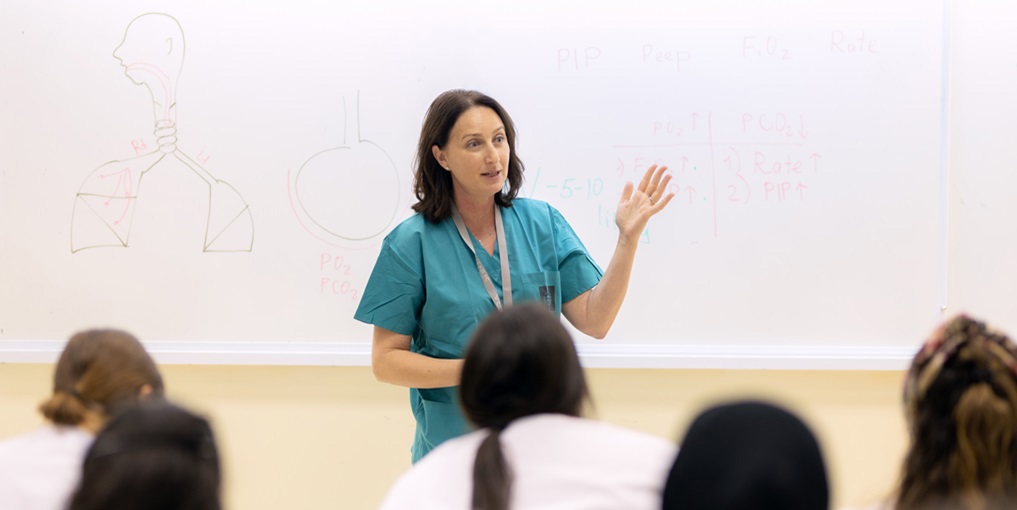Nurse Practitioner Programs
The next step in your career
The next step in your career

In recent years, the Ministry of Health has promoted nursing practitioners in various fields according to the needs of the population and the health system. As part of this policy, nurses who have completed specialization courses in various fields and obtained an appropriate licensure certificate are granted extended therapeutic authority, including the authority to make various medical decisions, and may perform various procedures in their area of expertise.
As a nurse practitioner who has successfully completed a nurse practitioner program, you will advise and guide patients and their families, alleviate pain through the regulation of drug therapy, perform a variety of treatments, balance chronic drug therapies, refer patients to tests, x-ray examinations, and medical advisors, and more.
Allow nurse practitioners with valuable professional knowledge to improve the quality and accessibility of the services provided in clinics and hospitalization departments. It will benefit the patients, their families, and the entire medical staff.
See information on the authorities granted from time to time to nurse practitioners, by field of expertise (in Hebrew)
Treating patients at the end of their lives, regulating a drug therapy to balance and alleviate symptoms, as well as counseling and supporting both patients and their families during the end-of-life journey.
Further details on the palliative care nurse practitioner course
Providing medical care for older adults: managing common diseases, identifying emergencies and providing initial care in case of emergency, and making referrals to other healthcare professionals.
Medical treatment for premature babies: providing routine treatment, identifying irregularities, providing immediate care in acute and life-threatening situations, providing care in a variety of complex conditions, and counseling parents and staff.
Medical treatment for diabetic patients: adjusting and stabilizing the condition to a level that allows for daily functioning and maintains a good quality of life, counseling and guiding patients, families, and medical staff, early identification of irregularities, and making referrals to other healthcare professionals.
General medical management for hospitalized surgical patients. This treatment includes routine therapy, symptom management, detecting and identifying irregularities, providing immediate care in acute and life-threatening situations, and counselling and supporting patients, their families, and the medical staff.
Nursing policy and administration involve the leadership and management of large-scale areas within a medical institution. This entails making informed and efficient use of resources, including human resources, knowledge, capital, material assets, and intangible assets, in order to achieve the organization's goals and ensure the delivery of quality medical treatment.
A post-basic nursing course is not a prerequisite, but administration studies are required.
For admission requirements and further details on health administration and policy specialty course
Further details on the pain control nurse practitioner course
Medical treatment for patients visiting community clinics funded by HMOs includes: treatment for mild acute conditions, care and management for chronic patients, disease prevention and health promotion, and guidance and counseling for patients and their families.
For more details on community specialization studies
Providing medical care for patients undergoing rehabilitation in hospitals and communities, including those with long-term medical conditions, with the goal of promoting their quality of life, reducing motor, cognitive, and medical complications, alleviating pain and suffering, and managing the patient’s rehabilitation process.
Further details on the rehabilitation nurse practitioner course
Providing medical care for acute and severe wounds and managing diseases associated with caring for patients suffering from wounds, stoma of various types, and urinary and fecal incontinence.
Further details on the wound, ostomy, and continence nurse practitioner course
Providing medical care for patients who turn to mental health community clinics, or mental health services in hospitals: providing medical care in acute conditions and balancing chronic mental patients, preventing mortality and promoting health, counselling and supporting patients and their families.
Providing immediate, life-saving care to people arriving at emergency departments (for both adults and children), including stabilizing patients, performing advanced assessments and diagnostic procedures, delivering urgent treatment based on the patient's condition, ongoing monitoring, identifying abnormalities, and providing appropriate care until discharge, transfer, or admission.
Prerequisite post-basic training courses:
Emergency Medicine
General Intensive Care (combined)
Pediatric Intensive Care
Neonatal and Pediatric Intensive Care (for premature infants, newborns, babies, and children)
Oncology and hematology involve providing medical care and managing symptoms for patients with cancer and blood disorders (both adults and children). This includes monitoring the patient’s condition, identifying abnormalities, and providing care throughout the different stages of illness and recovery.
Prerequisite post-basic training courses:
Oncology
General Intensive Care (combined)
Pediatric Intensive Care
Neonatal and Pediatric Intensive Care (premature infants, newborns, babies, and children)
Providing medical care and symptom management for patients with neurological disorders (adults and children), including monitoring the patient’s condition, identifying abnormalities, and delivering care throughout the stages of illness, recovery, or rehabilitation.
Prerequisite post-basic training courses:
Stroke Care
General Intensive Care (combined)
Pediatric Intensive Care
Neonatal and Pediatric Intensive Care (premature infants, newborns, babies, and children)
The tuition for nurse practitioner programs in 2026 is 12,600 NIS (except for the community medicine course - 15,000 NIS).
Nurse practitioner courses, opening dates and locations for 2026 will be announced at a later date.
Nurse practitioner course opening dates may change. To stay updated, follow the Nursing Administration's announcements.
Nurse practitioner licensure examination dates may change. To stay updated, follow the Nursing Administration's announcements.
Further details about each program and the tuition